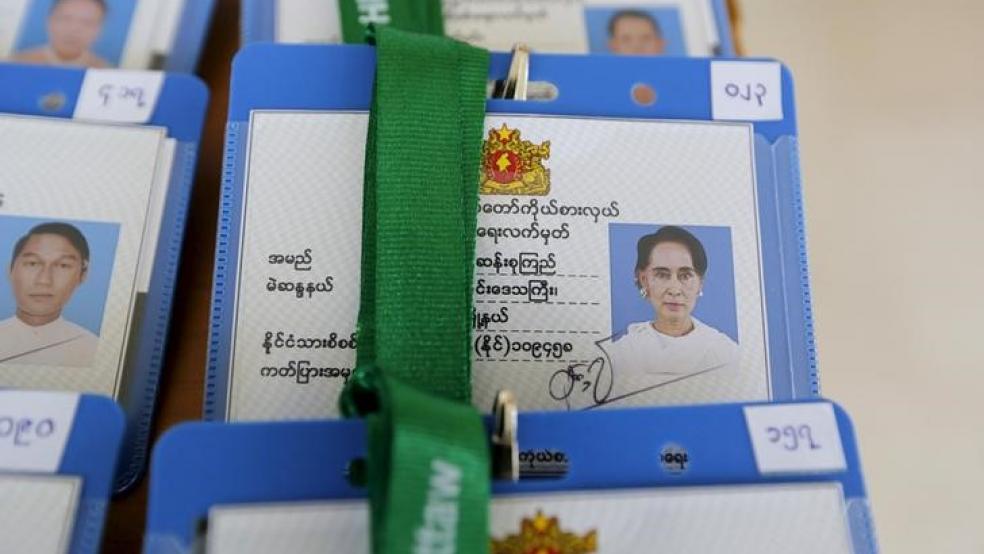YANGON (Reuters) - Taking his seat in Myanmar's parliament for the first time, Myo Zaw Aung, a one-time bodyguard for Aung San Suu Kyi, acknowledged the dozens of new lawmakers from her National League for Democracy (NLD) had a daunting task ahead.
"We're facing an uphill battle," said the 35-year-old novice legislator. "Most of us have little experience in government, but we are very determined to make it work."The new NLD members flooded the imposing parliament building on Monday, many clad in the traditional burnt orange tunics that have been worn by the party for decades and overwhelmed the olive green of the army bloc as the freshly elected legislature met for the first time since Suu Kyi's massive poll win in November.Expectations are sky-high after the NLD won about 80 percent of elected seats, crushing the junta-linked ruling party and setting the stage to replace the semi-civilian government of President Thein Sein."It was like a dream because Daw Aung San Suu Kyi fought alone against the military - and then she won," said Khin Maung Myint, a first-time NLD lawmaker from Hpakant, a remote town in the north of the country famous for its jade production.The former jade and gems trader clutched a black suitcase given to parliamentarians last week containing a starter kit for first-time MPs, including a copy of Myanmar's military-drafted constitution from 2008 and a basic guide to lawmaking."It did not only shake Myanmar, it shook the whole world," he said.The 255 members of the NLD's lower house caucus come from diverse backgrounds - artists, former political prisoners and small-scale entrepreneurs warily wandered the corridors of power together as they gathered to choose a speaker for the chamber.But they comprise two main groups: experienced pro-democracy stalwarts who were persecuted and imprisoned under the junta, and members of a younger generation that joined the party after the country embarked on a process of reform in 2011.The two groups share two things in common: they will be forced by the 2008 constitution to work with former enemies from the military; and they have very little experience of governing.FINE LINESuu Kyi has to tread a fine line, compromising between the change-hungry party grassroots, the general public and the army that still holds a quarter of seats in parliament and controls a large chunk of Myanmar's state apparatus.Choosing the speaker is another stop on the NLD's journey that began last September, when the candidates hit the campaign trail and canvassed votes in a well-organized operation, which included rigorous media training.Some activists left the party over Suu Kyi's choice of candidates as she focused on creating a disciplined caucus, leaving some experienced activists out and making room for well-educated younger members who can enact laws - and also could be more willing to engage with the army.Myo Zaw Aung was expelled from university in 2002 and was acting as Suu Kyi's bodyguard a year later during what has become known as the Depayin Massacre, when her motorcade was attacked by pro-junta thugs and 70 of her supporters were killed in what was seen as an assassination attempt."I was arrested and tortured, but I can forgive the military. We now have to work together to ensure a smooth transition," he said.The NLD resembles less a modern political party with a cohesive agenda, and more a broad movement united by years of struggle for democracy under Suu Kyi's charismatic leadership."I feel like the parliament is very big and marvelous, but still most people are poor," said Myint Lwin, a newly-elected NLD lawmaker. "I want to fulfill the people's wishes as much as I can and make their lives as marvelous as this parliament."The challenge now facing Myanmar's new ruling party is to turn vague aspirations into a coherent policy platform.King Ngaih Mang, 42, a new lawmaker from the Zomi Congress for Democracy Party, an ethnic party from Myanmar's impoverished Chin State, offered an insight into the scale of the task."Our region still doesn't have paved roads, it still has roads that were paved during the Second World War," she said. What we need for our region is the infrastructure, roads, healthcare, all of which are very necessary." (Additional reporting by Swan Pyae Win Naing and Antoni Slodkowski; Editing by Alex Richardson)Artists and prisoners face former foes as Myanmar's new rulers take seats

© Soe Zeya Tun / Reuters



